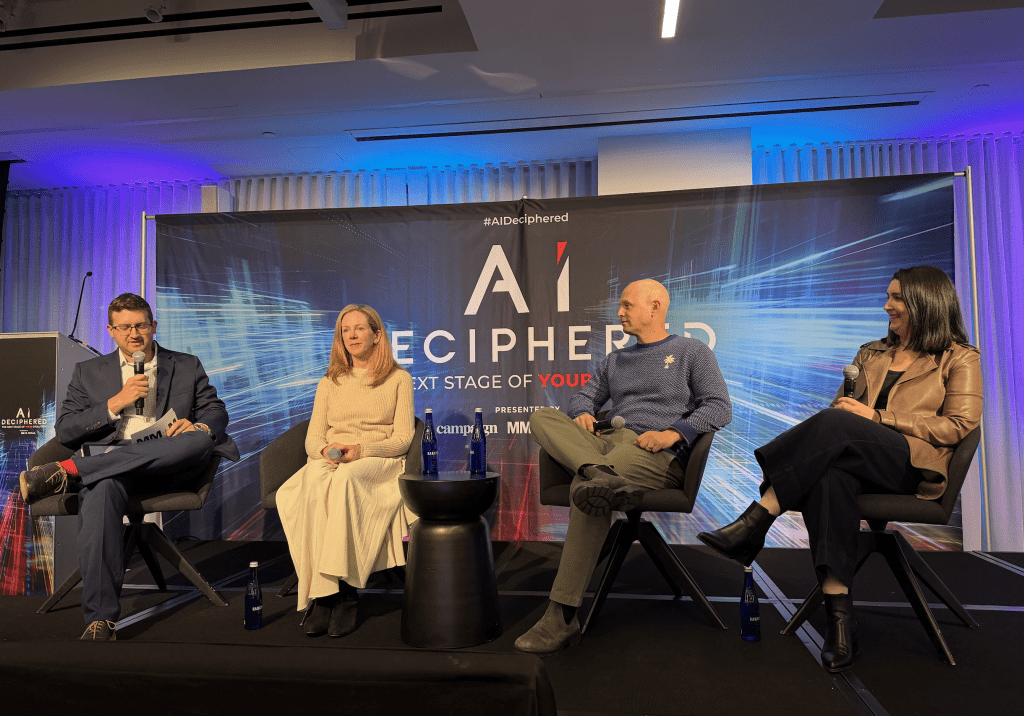Japanese digital health startup Ubie was at AI Deciphered last week showcasing one of the first concrete case studies of healthcare marketing inside conversational AI platforms.
The startup, which operates AI-powered symptom checkers used by 13 million people monthly, has conducted 400,000 interactions through its beta LLM chat interface. It is now testing direct-to-consumer pharmaceutical advertising within these conversations.
Xander Kerman Gregory, head of life science at Ubie, and Jake Bronstein, head of global marketing at the startup, presented their company’s findings during a breakout session.
Startup Says Building Proprietary LLM Interfaces is the Best Path for Healthcare Marketers
The presentation outlined three approaches healthcare marketers can take to reach the target audience of consumers using AI for health information.
- Organic optimization – This improves brand visibility through content strategies that increase LLM inclusion in general search responses. Multiple conference sessions addressed this approach, which Bronstein acknowledged as important but not sufficient.
- Pay-for-play advertising within major LLM platforms like ChatGPT – Bronstein said, “We all see these big, general LLMs going eventually, but none of them are really there yet, particularly in healthcare, with the regulatory and risk concerns.” He added even if e-commerce advertising appears in general LLMs within the next year, healthcare-specific advertising remains “probably years away” due to regulatory complexity.
- Building proprietary LLM interfaces – This is where Ubie has focused, creating what Bronstein characterized as “a real opportunity that isn’t just on the AIO side” but includes both data collection and promotional capabilities.
Doctors Don’t Love Stool Snaps, But the Blue Dog Is Happy to Look
Ubie’s core product is a symptom checker using modified Bayesian statistical approaches rather than LLM technology. The tool, which greets users with the friendly face of a blue dog, serves as both a consumer-facing browser application and intake forms for 2,000 hospitals and clinics.
The company launched Ubie Consult, an LLM-based chat interface, as a beta product approximately a year ago. The platform has conducted 400,000 interactions to date, with underlying medical information validated through the Mayo Clinic’s accelerator program.
The chat interface addresses what Kerman Gregory called common user behaviors in health AI tools: uploading photographs of symptoms (including stool samples), fact-checking health information from Instagram and asking questions that general LLMs might answer incorrectly.
“People upload pictures of their stool very commonly,” Kerman Gregory said, but physicians “don’t love looking at it. Our blue dog doesn’t mind, and can figure out what’s going on.”
How Advertising Integration Fits Into the Solution to Add Value
The start-up inserts pharmaceutical advertisements into chat conversations based on symptoms and conditions discussed. The AI tool’s “native ad formats” appear as educational content from the advertising pharmaceutical company within the conversation flow.
Bronstein emphasized that this advertising in the form of a content creation and delivery marketing strategy serves patient value by connecting people to appropriate treatments, framing promotional content as information delivery rather than traditional marketing.
A Cartoon Dog and Guardrails Work to Avoid Creepy Answers and Codependence
Guardrails around emotional responses, adverse event reporting requirements and medical accuracy help the company avoid over-personalized emotional responses that can degrade trust or create codependent relationships between users and generative AI.
Bronstein added that the company chose an anthropomorphic but non-human avatar (the blue dog) to lower the risk of users developing excessive trust in a human-like interface.
The interface also encourages appropriate healthcare utilization. Kerman Gregory said Ubie “will point you towards emergency resources if you need” them based on symptom severity.
Startup Issues an Open Call to Pharmaceutical Companies That Want First Mover Advantage
Bronstein said first-mover advantage matters significantly when building proprietary platforms and native audiences.
“Developing institutional knowledge takes time. Getting the capabilities, getting your teams ready to do things with these tools is everything,” Bronstein said.
Kerman Gregory added that pharmaceutical companies that begin testing now will “learn the basics of chat-based advertising before their competitors” and “develop first-party insights” about how patients discuss symptoms and treatments.
The company is offering free trial campaigns to pharmaceutical marketers willing to experiment with the format. “Love to experiment together,” Bronstein said. “Love to learn together.”




